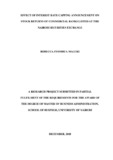| dc.contributor.author | Maluki, Rebecca S | |
| dc.date.accessioned | 2019-02-04T06:00:20Z | |
| dc.date.available | 2019-02-04T06:00:20Z | |
| dc.date.issued | 2018 | |
| dc.identifier.uri | http://hdl.handle.net/11295/106325 | |
| dc.description.abstract | In Kenya, the bill to cap interest rates was announced on 28th July 2016 and assented into law on the 24th August 2016. This move in regulating interest rates saw the introduction of interest rate capping on lending rates at 4.0% above the Central Bank Rate (CBR) and a floor on the deposit rates at 70% of the CBR. There have been arguments that interest rate capping restrictions could result in alternative lending by the financial institutions such as lending to government and or absolute withdrawal from specific locales such as rural areas or expensive market segments or rural areas when the capping becomes unprofitable. The study sought to find out the consequence of the interest rate capping announcement on stock returns of commercial banks quoted at the Nairobi Securities Exchange. The secondary data used for analysis in this study was gathered from the Nairobi Securities Exchange in regard to the 11 commercial banks listed. The study was an event analysis of the announcement of the Interest Rate Capping law on 28th July 2016. The study analyzed the reaction of stock returns of 11 listed commercial banks 30 days before the announcement of the law and 30 days after the announcement of the law. Analysis of the data was done with the aid of Microsoft’s Excel (2010). T-test was carried out to establish the significance of the interest rate capping announcement on stock returns. The study found out that only 18.18% reacted negatively to the interest rate capping announcement. All the other (81.82%) banks reacted positively. The study further established that seven commercial banks (63.64%) recorded negative abnormal returns while four commercial banks (36.36%) recorded positive abnormal returns in reaction to the announcement of the interest rate capping law. However, none of the abnormal returns were found to be statistically significant. Further, none of the abnormal returns recorded were greater than 1 or less than -1 implying that none of the investors benefited or lost abnormally as a result of the interest rate capping announcement. The study found out that there was a steady decrease in Cumulative Average Abnormal Returns of the commercial banks listed at the Nairobi Securities Exchange. This implies that the announcement of the interest rate capping legislation had a cumulative negative effect on the stock returns for commercial banks listed at the Nairobi Securities Exchange. This implies that although some banks did not react negatively to the interest rate capping announcement, the cumulative effect of the event had an adverse effect on the stock returns in the long run. The study found out that the interest rate capping announcement had a cumulative negative effect on the stock returns for commercial banks listed at the Nairobi Securities Exchange. The study therefore recommends that Central Bank of Kenya should reconsider and appeal the interest rate capping law as this is detrimental to the performance of commercial banks. The Central bank of Kenya should liaise with commercial banks to ensure that even if the interest rate capping law is abolished, the commercial banks do not exploit borrowers by charging exorbitant interest rates. | en_US |
| dc.language.iso | en | en_US |
| dc.publisher | University of Nairobi | en_US |
| dc.rights | Attribution-NonCommercial-NoDerivs 3.0 United States | * |
| dc.rights.uri | http://creativecommons.org/licenses/by-nc-nd/3.0/us/ | * |
| dc.title | Effect of Interest Rate Capping Announcement on Stock Returns of Commercial Banks Listed at the Nairobi Securities Exchange | en_US |
| dc.type | Thesis | en_US |



